Make It - full round-up of the event and projects
Building on the innovation discussion held in September, an innovative Make It weekend, held on 14-16 November, brought together health and care service providers, service users, designers, artists and developers to work on projects to improve health and
- 17th December 2014
Building on the innovation discussion held in September, an innovative Make It weekend, held on 14-16 November, brought together health and care service providers, service users, designers, artists and developers to work on projects to improve health and care in Bristol. The weekend focused on developing best fit solutions to real local need.
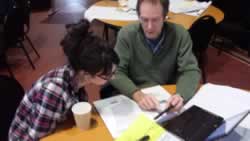
The weekend kicked off with a Friday evening drinks reception and presentations from health, care and tech experts. These set the scene and stimulated ideas for projects, which were worked on during Saturday’s work session, and presented to a panel on Sunday.
Drawing on the convention of ‘hackathon’ events, there was a focus on technical solutions. However, the event was deliberately inclusive, with the focus on real world, local issues. The presentations on Sunday showed that a community spirit and shared intent grew from the collaborative working over the weekend.
The event was opened by Bristol Health Partners Director David Relph and facilitated by independent educational facilitator and consultant John Kellas. Chris Reay from This Equals and Adam Lester-George and Tyeth Gundry from Lelan Solutions provided data analytics support.
Friday evening presentations
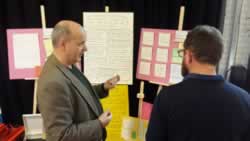
Dr Jo Hartland spoke about the Avon Primary Care Research Collaborative (APCRC) which supports commissioners to access evidence from research, evaluation and published best practice. They are developing an evaluation toolkit. View Dr Hartland’s Powerpoint presentation.
Cardiac surgeon Milan Bates spoke about the importance of a person-centred approach, when developing technical solutions. Milan has worked with Nudge Digital to develop Mi Heart, a care communication platform allowing the communication of symptoms, appointments, vital statistics and medication between patients and their care team. This is a topic Milan also spoke about at TEDMED Bristol 2013.
Juliette MacCormack, an analyst at Mayden, presented on the use of mapping in improving access to psychological therapies (IAPT). This NHS programme rolls out services across England, offering NICE approved treatments for people with depression and anxiety disorders. Juliette demonstrated visualisation software which enables the identification of unmet need in IAPT.
Phil Hall, an artificial intelligence (AI) technology expert, presented a compelling case for the use of AI in healthcare. Phil talked about Second Life as an example of how virtual worlds are blurring the lines between reality and unreality. Phil warned of the dangers of leaving the development of technology to a small minority. Our online world is filtered based on our previous activity. This ‘filter bubble‘ has more effect on our online experience than we think.
Rhiannon Thomas and Tom Pick from Patients Know Best (PKB) provided insight into the field of patient-controlled data. Rhiannon and Tom explained why patients should control their own data, and gave insight into the PKB toolkit and their future development plans.
Andy Morley presented on the problems and potential of post hospital discharge tools. Ninety per cent of people receive little or no support post-discharge, and tablet and other technologies could help ensure people have continuing support. Andy is working with an emergent South West Digital Health Cluster, and invited people to get involved.
William and Angela Beale, who are patient and carer representatives in the Chronic Kidney Disease Health Integration Team, presented on renal health, and patient transport initiatives. Proposing a shared transport initiative for patients, the Beales said: “We propose that if patient groups are listened to, systems can be strongly improved.”
Saturday’s work session
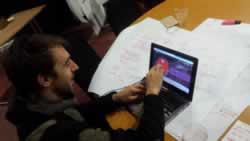
Starting with breakfast and round table discussion, Saturday allowed people to collaboriate and match ideas and skills to projects. Work was undertaken in programming, design and research, allowing people with complementary skillsets to work collaboratively.
Participants had expertise in a number of specialisms, including:
- David Richards, of Art and Power, focused on the possibilities of personal empowerment and wellbeing through creative expression
- Dr Alan Kellas gave insight into how the health community is recognising the therapeutic value of nature, through initiatives such as green prescribing
- Jessica Williams from Bristol City Council worked with developers to flesh out ideas for nutritional games to engage and educate young people
- Kevin Kirkland from Data Unity, a Bristol-based open source data integration platform, worked with open data from Bristol City Council. Open source and open API software is a potential solution to lower costs and aid interoperability in the NHS. NHS England already has a national initiative in place to explore open source technology
- Andy Morley invited input into a telehealth initiative and a project to create a ‘discharge companion channel‘. Andy highlighted Sphere and the South West Digital Health Cluster as key initiatives in Bristol’s health technology landscape
Building solutions: Example case studies
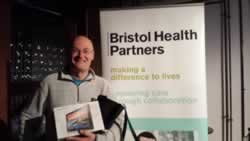
Inspired by William and Angela Beale’s talk on Friday, Rinaldo Tempo of Pervasive Health experimented with data algorithms to coordinate hospital transport using patient data from the Patient Knows Best system. Patients Know Best puts patients in control of their medical records and allows them to selectively share their records. This patient record system could potentially store all the necessary information to coordinate transport arrangements for patients that share similar appointment times and also live in the same area.
Rinaldo used Pervasive Health’s Apervita platform to pull relevant medical record data from Patients Know Best and find the best matching patients based on clinic location, appointment times and patients’ home locations.
Matt Hamilton, a consultant at Enquos, created a working prototype that could extract information from the Patients Know Best database and inform a personal data interface. Enquos is the first comprehensive system to track, organise and securely store an individual’s nutrition, fitness and health data, while providing tools to optimise their choices.
Sunday presentations
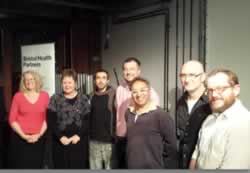
Participants presented their projects to an audience of the public and a panel of expert judges, including:
- Harry Hayer, Director of People and Organisation Health, North Bristol NHS Trust
- Pat Foster, General Manager, Healthwatch Bristol
- David Relph, Director, Bristol Health Partners
- Julia Clarke, Chief Executive, Bristol Community Health
Presentations included:
- Nigel Legg demonstrating the Osmium social filter, searching Twitter for symptom keywords
- Rinaldo Tempo on matching patients to hospital transport
- Matt Hamilton’s personal data interface for nutrition
- Andy Morley’s discharge companion channel
- Paschal McDonnel mapping health history
- Greg Smart and Phill Hall demonstrating artificial intelligence bot Walking Talking Lawrence
- Alan Kellas on the efficacy of nature in psychological therapies
- Chris Larcombe using his platform Noomap (www.noomap.info and www.noomap.com) to map Bristol’s health and care community collaboratively. Watch Chris’s presentation below, although the sound quality is poor in places
Development funds to take the projects to the next stage were awarded to:
- Chris Larcombe – using Noomap as a collaborative mapping tool for Bristol’s health and care community
- Phil Hall and Greg Smart for their wellbeing chatbot Walking Talking Lawrence, using conversational artificial intelligence
Updates on these projects will be provided in the new year. In the meantime, the Bristol health community Noomap is available here: http://noomap.com/hco.bristol. It is still being developed and will be trialled in the new year.
Rinaldo Tempo won a Lenovo Tablet for his work matching patients to hospital transport, awarded by a vote amongst the weekend’s participants. Prizes of waterproof keyboards, UKChip registration and an app controlled paper aeroplane were awarded to other participants.
Based on feedback from the participants and the quality of the projects Bristol Health Partners plan to host another Make It in 2015. Please email [email protected] with ideas or to find out how you could get involved.
We would like to take this opportunity to thank the event’s sponsors:
- Lenovo
- The Keyboard Company
- Nudge Digital






